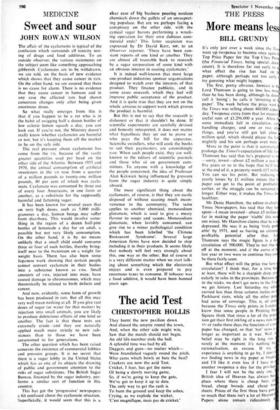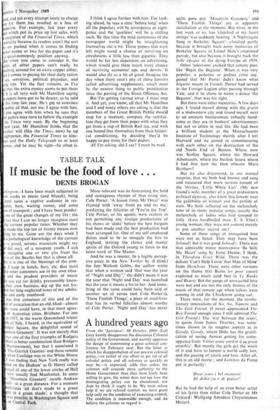THE PRESS
More means less
BILL GRUNDY
It's only just over a week since the Ti, went up twopence to become once again Top Price Paper for the Top Class Per, (the Financial Times, being special, doesn count). It is therefore far too early to what effect the rise has had on paper, although perhaps not too early try guessing what might happen.
The first, pretty obvious, forecast is th Lord Thomson is going to lose less mon than he has been doing, although he does call it 'losing' ; he calls it 'investing in paper'. The week before the price went the Times. was selling about 460,000 copies day. Twopence extra from that lot means useful sum of £1,296,000 a year. Allow some immediate fall in circulation, ex handling charges, and one or two oth things, and you've still got left about million quid, which should please the Lc mightily and his son perhaps even more More to the point is that it automatic prolongs the Times's expectation of life. Le Thomson has said that he's prepared to I —sorry, invest—about £.2 million a year f five years or so in the hope that he'll ha at the end of it, a property worth £15 milk You can see his point. But reducing t yearly losses by Ll million means that t paper can get to the point of profitabill earlier, or the struggle can be sustained longer. Either way, it'makes the Times lo healthier.
Mr Denis Hamilton, the editor-in-chief Times Newspapers, has said that they ha spent—I mean invested—about £5 million far in making the paper 'viable' (his wet not mine). Mr Hamilton claims that he is n depressed. He sees it as being 'truly pro able' by 1971, and as having an extreme profitable potential after that. Lo Thomson says the magic figure is a dal circulation of 500,000. They're not that off at the moment, and if the curve of I last year or two were to continue they cou be there fairly soon.
But what effect will the price rise have. circulation? I think that, for a time bet at least, there will be a sharpish drop. Pa cularly in sales in the provinces. Because, in the sticks, we don't get news in the Ti we get history. Last Saturday my edit carried less than three column inches on Parkhurst riots, while all the other pa had acres of coverage. This is, of con because the Times only prints in London know that some people in Printing 1-10 Square think that since a lot of the pot tion get their first inkling of a news item TV or radio these days the function of ace paper has changed, so that 'hot' news is longer as important as it was. Well. belief may be right in the long run. surely at the moment it's nothing bill rationalisation, an excuse. If my ° experience is anything to go by, I donI I not finding news in my paper at break and I'll like it even less if I have to another twopence a day for the privtleg I fear I will not be the only one. British idea of Heaven has always be place where there is cheap beer, c bread, cheap broads and cheap br sheets. Prices of the first three have gone so much that there isn't a lot of Heaven Papers alone remain ridiculously ed, and yet every attempt lately to charge are for them has resulted in a loss of illation. For example, last year every which put its price up lost sales, with exception of the Financial Times, which probably because its readers aren't the sort 0 are pushed when it comes to finding other penny or two for the paper and it's a quasi-monopoly position anyway.
But when you come to consider it, the ders of other papers can't really be atching around for an extra copper either, en it comes to paying for their daily ration sex, sensation, political prejudice, and ,ing tips. Yet the fact remains, as I've d, that the extra money seems to put them • It is all very well Mr Hamilton saying papers have got to be dearer, as he told • this time last year. He's got to convince public of that, not me. I agree with him. also agree with him when he says that r papers may have to follow the example the Times very soon. By the beginning next year, Mr Hamilton thinks that the ardian will (like the Times now) be up eightpence, the Financial Times to nine- e, and the Daily Telegraph to at least pence, and he may be right—he often is. I think I agree further with him. For look- ing ahead, he sees a time 'before long' when all the populars will be sevenpence or eight- pence and the 'qualities' will be a shilling each. By this time the mad economics of the newspaper world might be straightening themselves out a bit. Those papers that were left might stand a chance of surviving on circulations a little less than gigantic. They would be far less dependent on advertising, which would give them much more chance of surviving economic ups and downs. It would also do us a bit of good. Imagine the day when there aren't any of those horrors called advertising supplements, which must be the nearest thing to public prostitution since the passing of the Street Offences Act.
But I'm getting carried away. I must stop it. And yet, you know, all that Mr Hamilton and I and many others are asking is that the members of the Great British Public should stop for a moment, compare the satisfac- tion they get from their paper with what they get from a cup of British Rail tea, and with one bound free themselves from their histori- cal conditioning, by deciding they'd be happy to pay more for their papers.
All I'm asking, did I say? I must be mad.















































 Previous page
Previous page